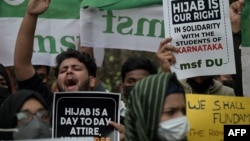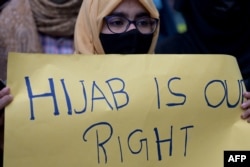Authorities ordered schools in southern India to close for three days as protests grew over a ban on wearing the hijab.
At one demonstration Tuesday, officers fired tear gas to scatter protesters at a government-run school campus. A larger-than-usual police presence was noted at schools in nearby towns in the southern Indian state of Karnataka, Agence France-Presse reported.
"I appeal to all the students, teachers, and management of schools and colleges … to maintain peace and harmony," Basavaraj Bommai, the chief minister of Karnataka, said after announcing the school closures, according to AFP.
Muslim students in Karnataka state had been told not to wear the hijab and were prohibited from entering classrooms with it on. Since December 31, students wearing headscarves at Udupi College have been marked absent despite their attempts to attend their classes, according to Al-Jazeera news service.
The first student protests began at Udupi College, an all-girls high school in the Udupi district of Karnataka. As more schools began banning the hijab, students filed petitions with the state courts claiming that their religious rights were being challenged, the Associated Press reported. On Tuesday, Karnataka's top court began hearing one of these petitions but adjourned before ruling.
"What we are witnessing is a form of religious apartheid. The decree is discriminatory, and it disproportionately affects Muslim women," said A.H. Almas, a student who has been protesting at the school for weeks, AP said.
In response to the Muslim protests, some Hindu students began wearing saffron shawls, a symbol of Hindu nationalist groups, according to AP, and claiming the protests were disrupting their education.
On Monday, Udupi College allowed girls wearing hijabs to attend classes, but they had to sit in separate classrooms, AP reported.
"It is humiliating," Almas said. "How long are we going to accept that citizens can be stigmatized because of their religion?"
Minority communities have been expressing a growing fear of increasing persecution under the government of Prime Minister Narendra Modi.
Bharatiya Janata, Modi's Hindu nationalist party, governs Karnataka state and has expressed its full support for the ban, according to AFP.
Some information for this report came from The Associated Press and Agence France-Presse.






